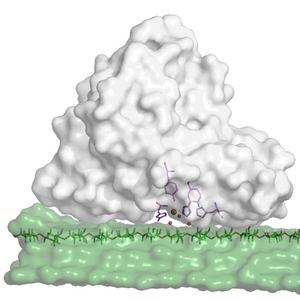Researchers use supercomputer to improve catalysts for biofuel




Gregg T. Beckham, National Renewable Energy Laboratory
July 3, 2014
BY National Science Foundation
Scientists from the National Renewable Energy Laboratory are using the National Science Foundation-supported Stampede supercomputer to improve biofuel production by determining how certain enzymes break down cellulose (plant cell walls).
In a paper published in the Proceedings of the National Academy of Sciences in January 2014, they describe a newly-discovered, naturally-occurring enzyme modeled with Stampede that could significantly speed up the process by which cellulose is decomposed. The enzyme, called lytic polysaccharide monooxygenase or LPMO, represents an important, unique discovery because of its prevalence in nature, and its potential importance to cost-effective biomass deconstruction.
Using Stampede, the researchers examined two ways that the fungal enzymes catalyze reactions. The simulations suggest that the binding of copper and oxygen by the enzymes is critical to its function. The group is also using Stampede to design chemical catalysts for high-temperature deoxygenation chemistry, which is important to convert biomass to fuels.
NREL Senior Engineer Gregg Beckham said, "Stampede has been an absolutely essential resource for our group to examine biological and chemical catalysts important for the production of renewable transportation fuels from lignocellulosic [plant-based] biomass."
Advertisement
Advertisement
Advertisement
Advertisement
Related Stories
The U.S. Department of Energy Bioenergy Technologies Office (BETO) announced up to $23 million in funding to support research and development (R&D) of domestic chemicals and fuels from biomass and waste resources.
The U.S. DOE has announced its intent to issue funding to support high-impact research and development (R&D) projects in two priority areas: sustainable propane and renewable chemicals and algal system cultivation and preprocessing.
Sens. Sherrod Brown, D-Ohio, and Pete Ricketts, R-Neb., in August introduced the Renewable Chemicals Act, a bill that aims to create a tax credit to support the production of biobased chemicals.
The Chemical Catalysis for Bioenergy Consortium, a consortium of the U.S. DOE’s Bioenergy Technologies Office, has launched an effort that aims to gather community input on the development of new biomass processing facilities.
USDA on March 8 celebrated the second annual National Biobased Products Day, a celebration to raise public awareness of biobased products, their benefits and their contributions to the U.S. economy and rural communities.
Upcoming Events










